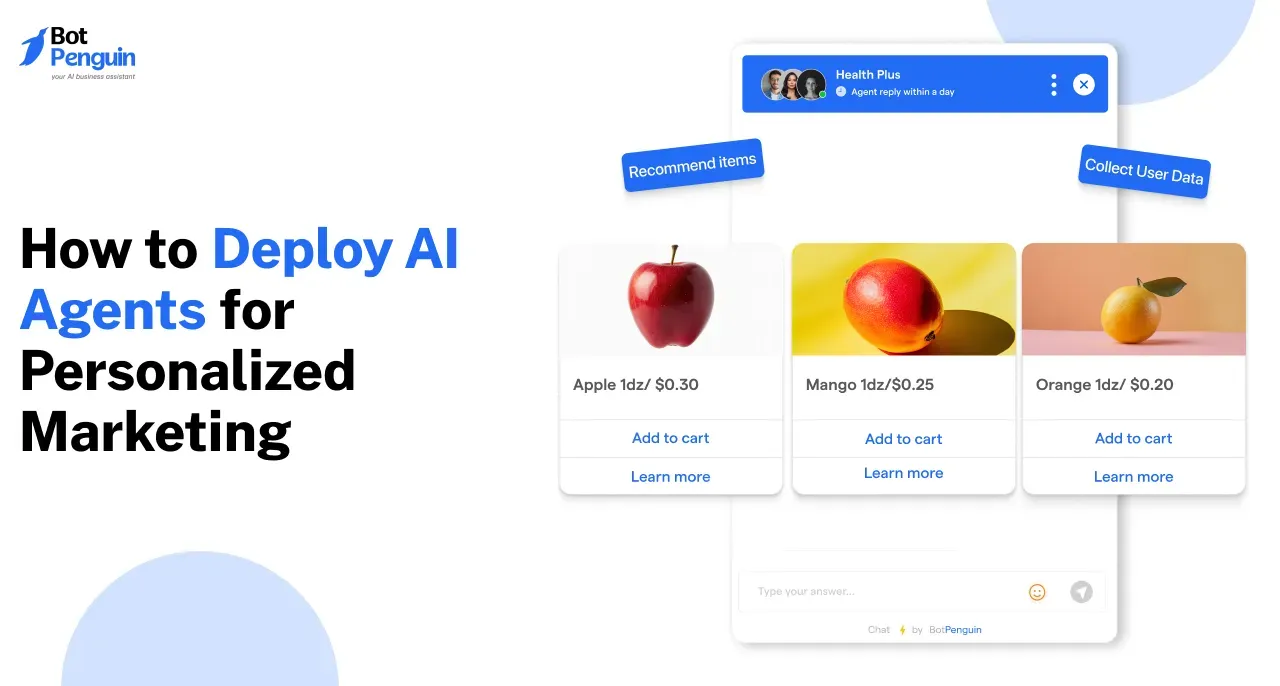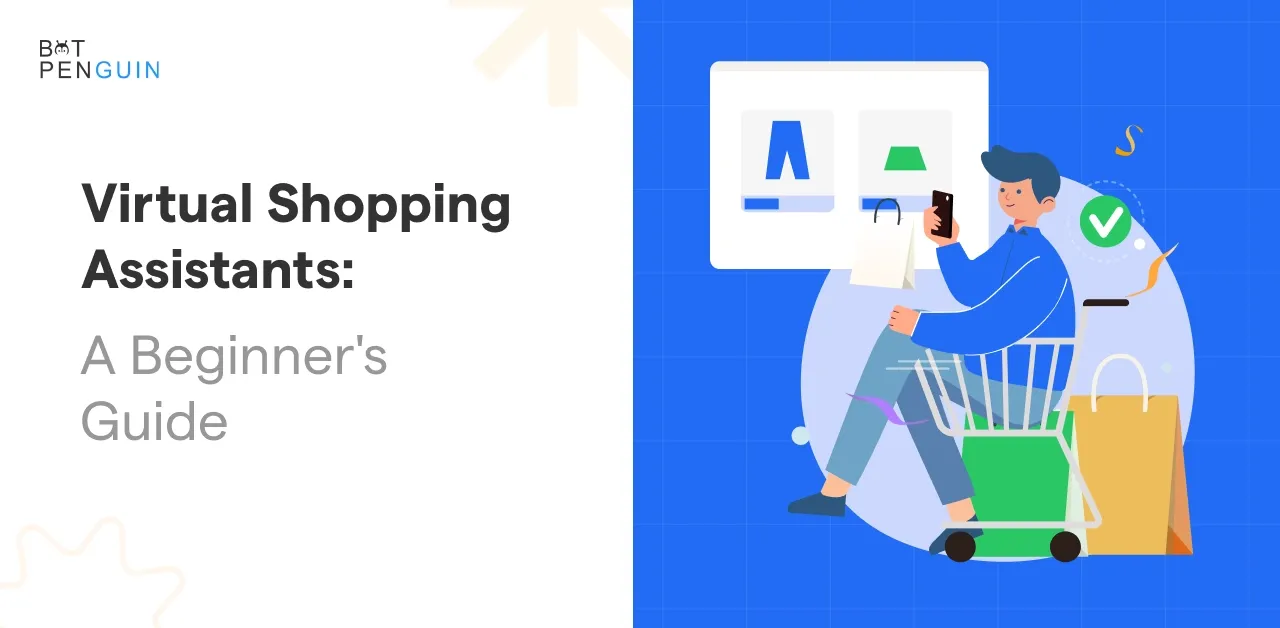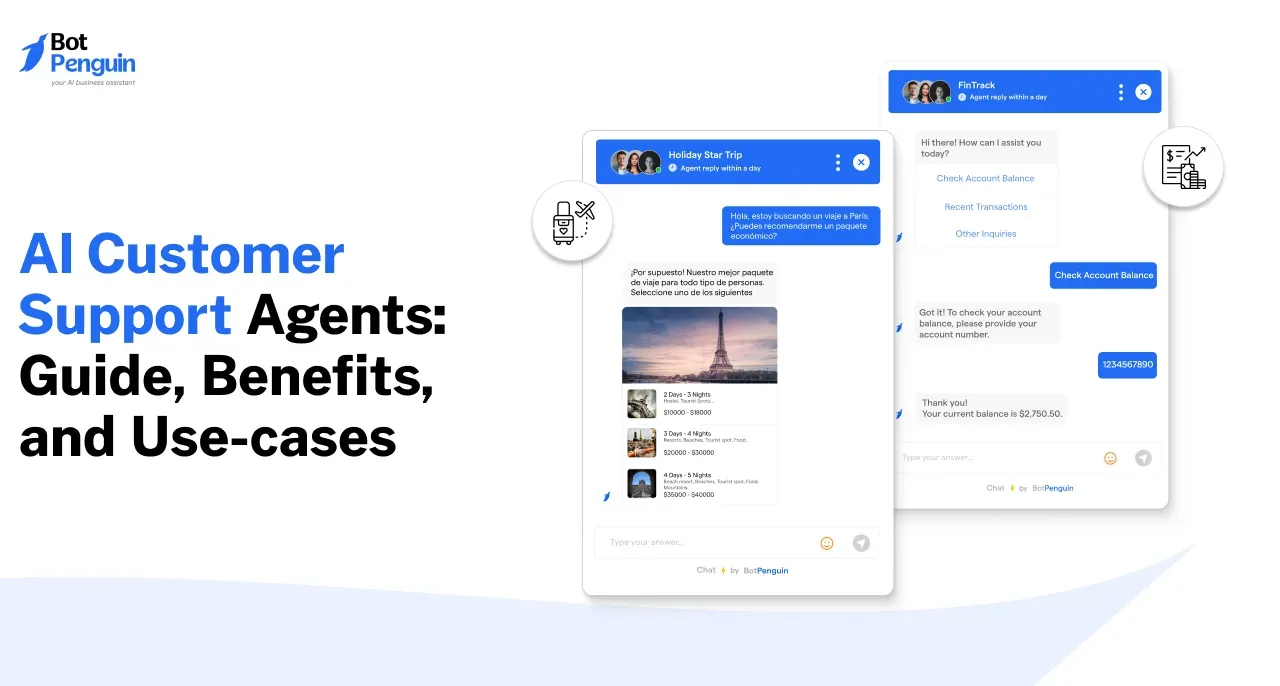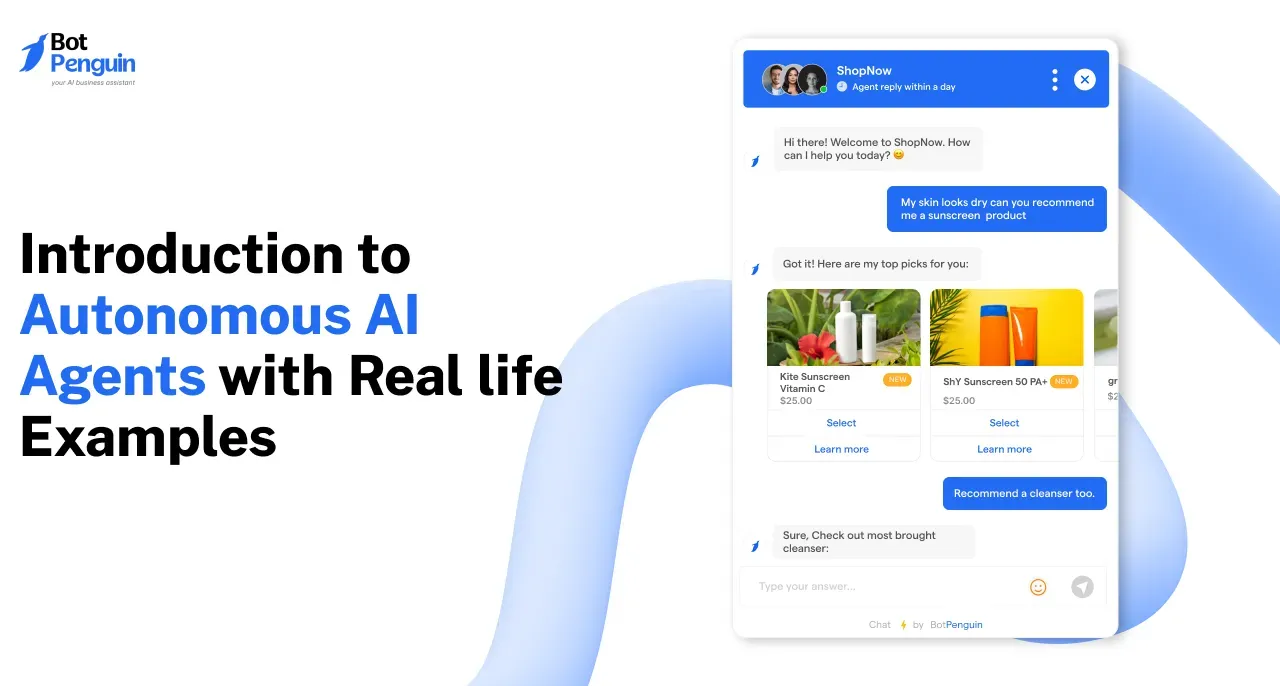Introduction
In marketing, maintaining customer engagement and satisfaction is vital. You have to attend to customers immediately to provide a good user experience.
Though you might have several human agents for this purpose, in peak seasons the task becomes more complicated.
This is where AI agents can come to your rescue. They can process data, detect patterns, and deliver personalized experiences faster and better than humans ever could.
This guide will show you how to deploy AI agents that can weave their magic in marketing and take your businesses to greater heights. With the right approach, you will be able to create campaigns that deeply resonate with your customers.
So, are you ready to turn AI’s neutrality into your biggest marketing advantage? Let us get started.
What are AI Agents in Marketing?
AI Agents for marketing are tools or systems powered by artificial intelligence. Using machine learning, they can analyze data, interact with customers, and execute tasks like lead generation.
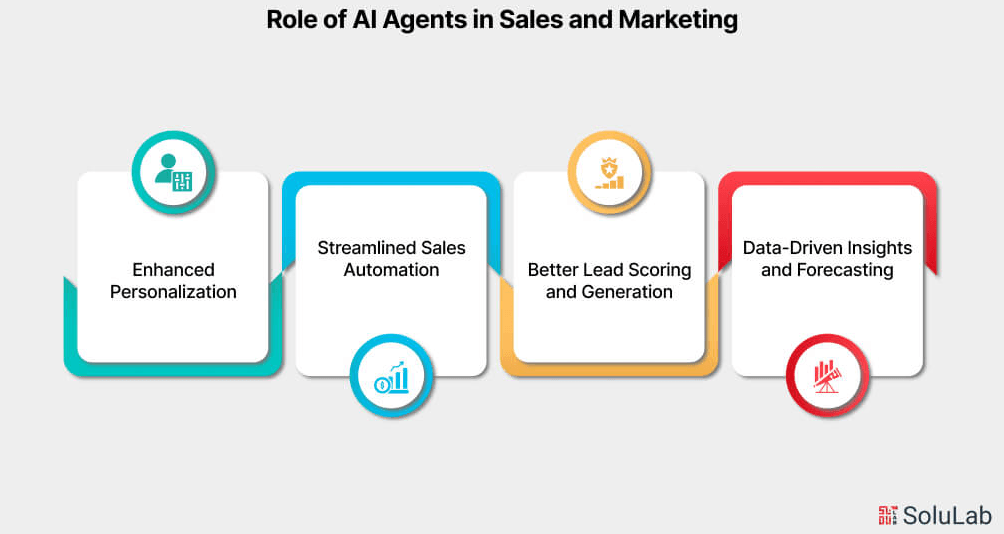
These agents also create personalized experiences by understanding customer data and can automate and optimize marketing efforts.
At their core, AI agents learn from data. They use this knowledge to make decisions and perform tasks with minimal human involvement. You can think of them as smart assistants that deliver results faster and more efficiently.
How Do AI Agents For Marketing Work?
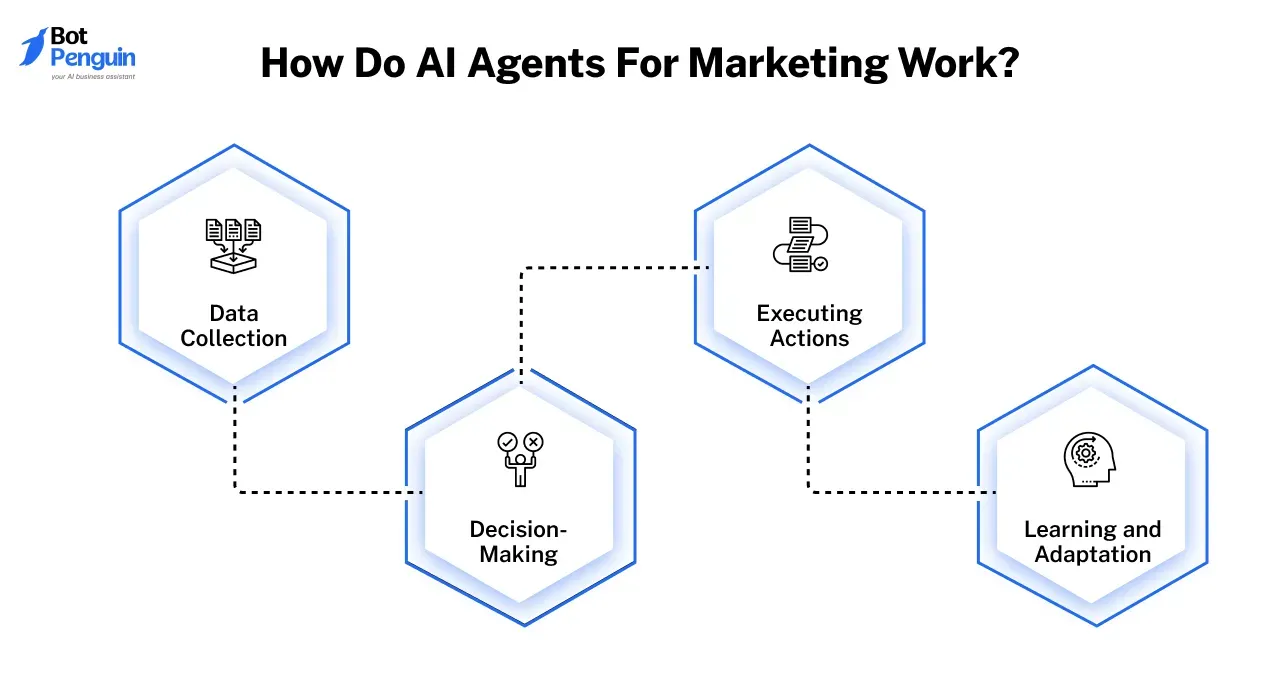
AI agents for marketing are proving to be advantageous by helping businesses develop highly personalized marketing strategies. This enhances user experience, which ultimately increases ROI (Return on Investment). Let us explore how they work in detail below.
- Data Collection: This is the first step where these AI agents collect data from various sources like customer conversations, social media discussions, and transaction records. This information is helpful in interpreting the context and nuances of customer queries effectively.
- Decision-Making: Once the data is collected, these AI agents use deep learning models to analyze the data, recognize patterns, and make informed decisions.
- Executing Actions: Here, the agents execute the required actions based on their decisions in the previous step. This can be anything from answering a customer query to processing a request.
- Learning and Adaptation: One of the best qualities of these AI agents is their learning ability. They learn constantly from every interaction and fine-tune their algorithms to enhance accuracy and efficiency. So, even as business needs and customer expectations evolve, these agents can handle them effectively.
By seamlessly integrating data analysis, decision-making, and continuous learning, AI agents for marketing enable businesses to connect with their customers more effectively.
Some Examples of AI Agents in Action
- Chatbots: These AI agents answer questions, provide recommendations, and even guide customers through purchases.
- Recommendation Engines: Platforms like Netflix or Amazon use AI to suggest content or products based on your history and preferences.
- Email Automation Tools: AI-powered tools can craft and send personalized emails to large audiences, boosting engagement and conversions.
AI Agents for marketing are no longer just an option. They are becoming essential for brands aiming to stay competitive. By handling key functions like data analysis and personalization, they help marketers focus on strategy while delivering results.
Key Benefits of Deploying AI Agents for Personalization
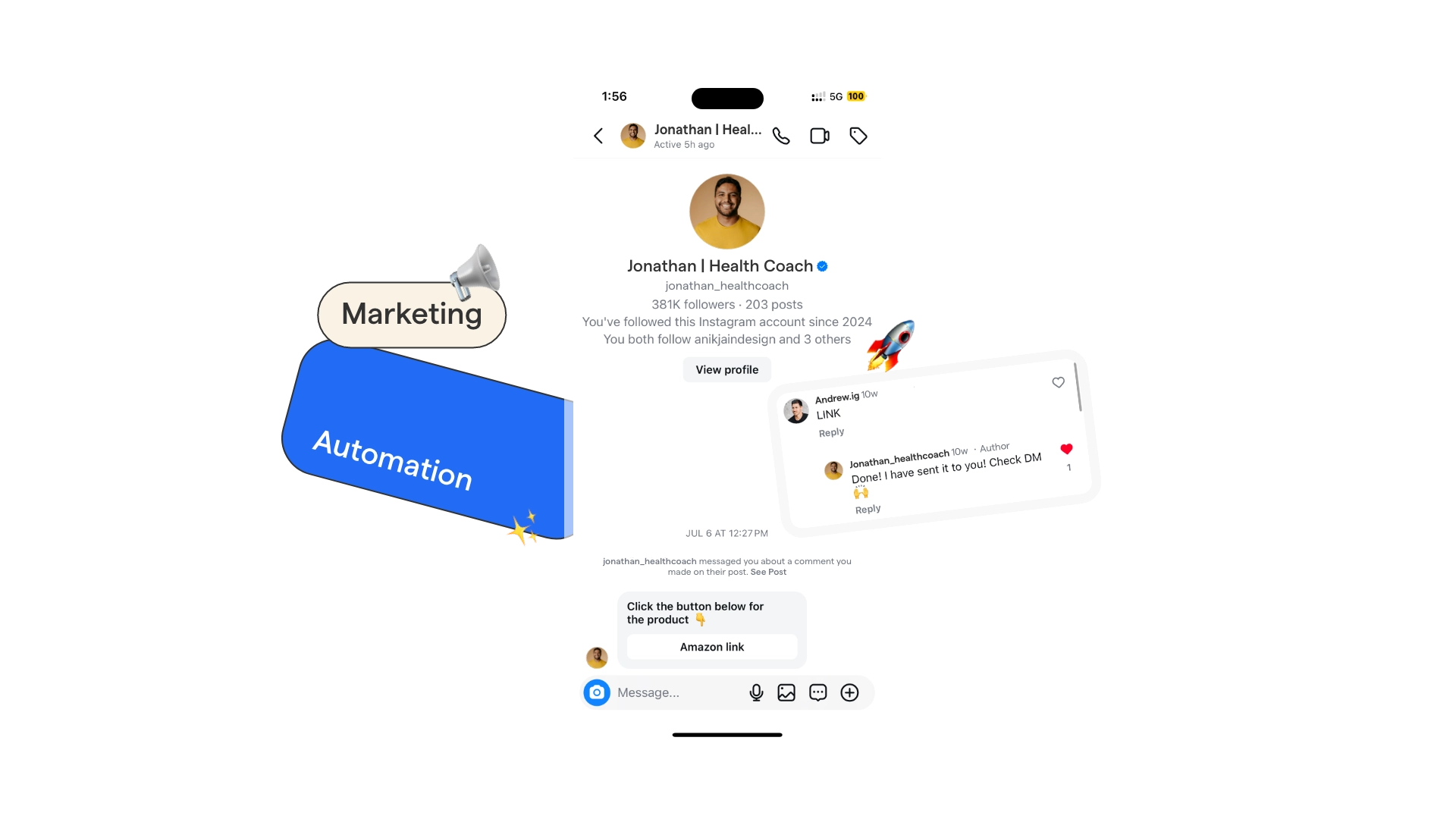
Personalization has become the backbone of effective marketing. Customers expect messages and experiences tailored to their preferences.
AI Agents for marketing make this possible by handling personalization at scale. Let us explore the key benefits they offer.
Faster Execution
Speed is critical in marketing. AI Agents for marketing excel at this task by automating repetitive tasks like sending targeted emails or generating personalized content.
This ensures campaigns are executed faster without compromising quality. For example, an AI tool can segment audiences and send custom offers in minutes, a task that could take hours for a team.
Scalability
Manually personalizing campaigns for thousands of customers is nearly impossible. AI changes this.
AI Agents for marketing can process massive datasets and create unique experiences for each customer. Whether you are targeting a hundred or a million users, AI ensures every interaction feels personal.
Data Utilization
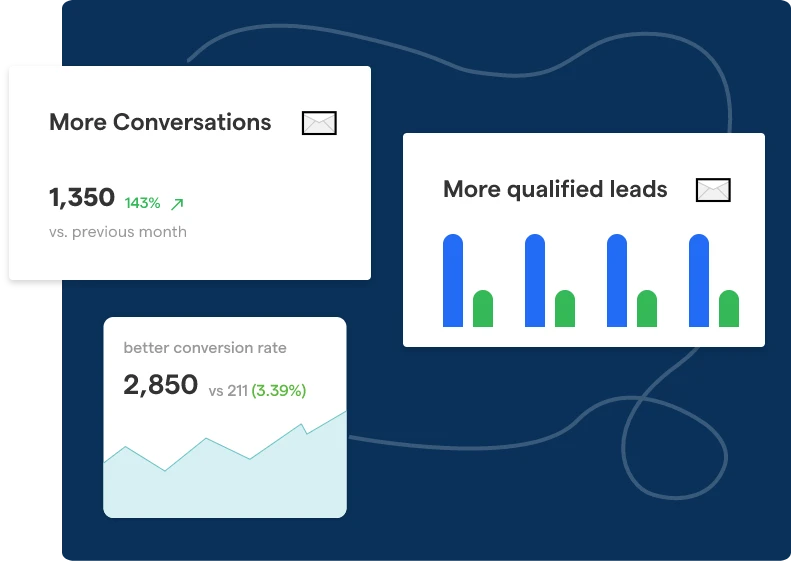
AI excels at analyzing data. It can analyze vast amounts of customer information to uncover trends and preferences.
This helps marketers understand their audience better and craft more effective strategies. For example, an AI system might reveal that customers in a specific region prefer certain product categories.
Cost Savings
By automating tasks and reducing manual workload, AI Agents for marketing save time and resources.
Teams can focus on strategy and creativity instead of dwelling on routine operations. Over time, this leads to significant cost reductions while maintaining high efficiency.
Improved Accuracy
Human error in segmentation or targeting can hurt marketing performance. AI minimizes these mistakes.
AI Agents for marketing rely on data-driven insights to deliver precise results. This means fewer mismatched campaigns and better alignment with customer needs.
Hence, AI agents for personalization transform marketing by making it smarter, faster, and more customer-oriented, ensuring every interaction is meaningful and strengthens connections.
Steps to Deploy AI Agents for Personalized Marketing
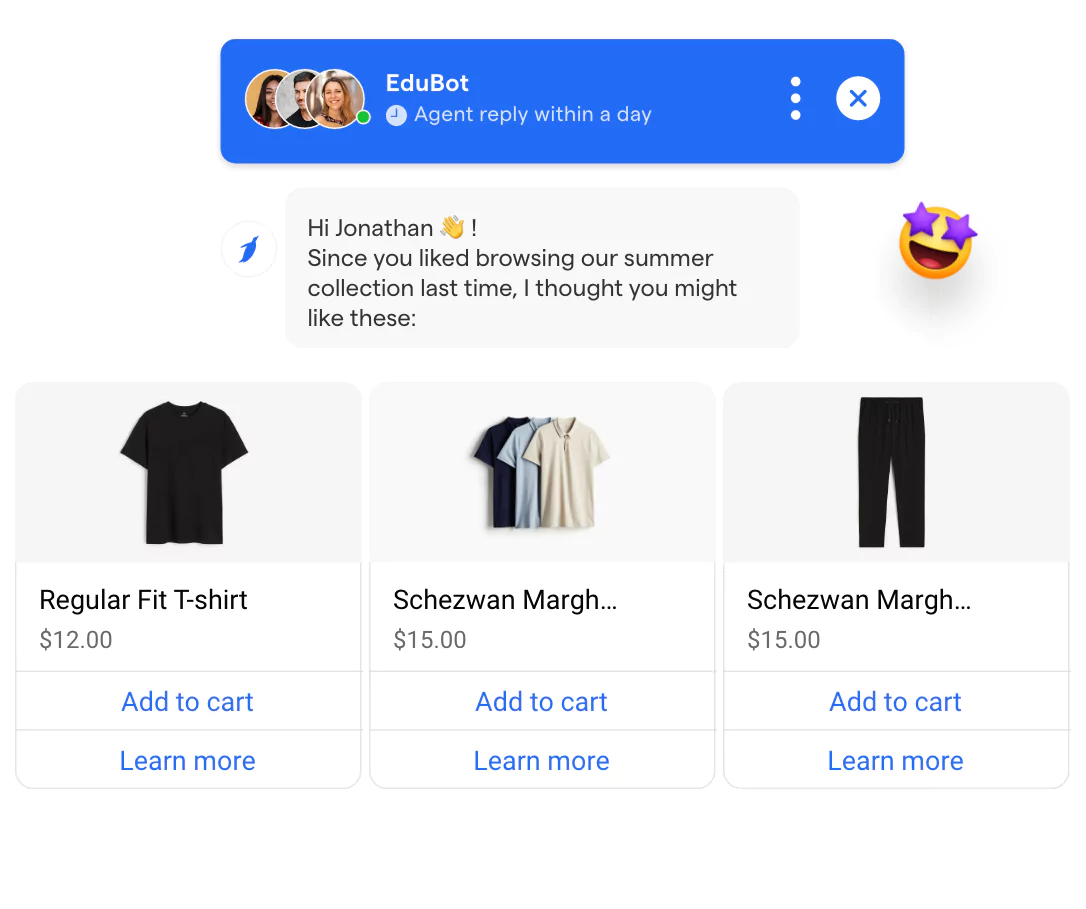
Using AI Agents for marketing effectively requires a structured approach. Personalization is the ultimate goal, but achieving it involves multiple steps, from understanding your audience to optimizing campaigns over time.
Here is a detailed guide to deploying AI for personalized marketing.
Step 1
Define Your Goals
Begin with a clear purpose. What do you want to achieve by deploying AI Agents for marketing?
Common goals include increasing engagement, reducing response times, improving customer satisfaction, or boosting conversion rates. To achieve these goals, you need to select appropriate AI technologies as given below:
- Natural Language Processing (NLP): For chatbots and virtual assistants.
- Machine Learning Models: For audience segmentation and personalization.
- Predictive Analytics: To anticipate customer needs and suggest relevant offers.
AI agents like BotPenguin can play a key role by helping you better understand your customers' requirements.
With its ability to analyze customer data and automate interactions, BotPenguin provides valuable insights into what drives engagement and satisfaction, enabling businesses to set goals that are both achievable and aligned with their audience’s preferences.
Step 2
Collect Customer Data
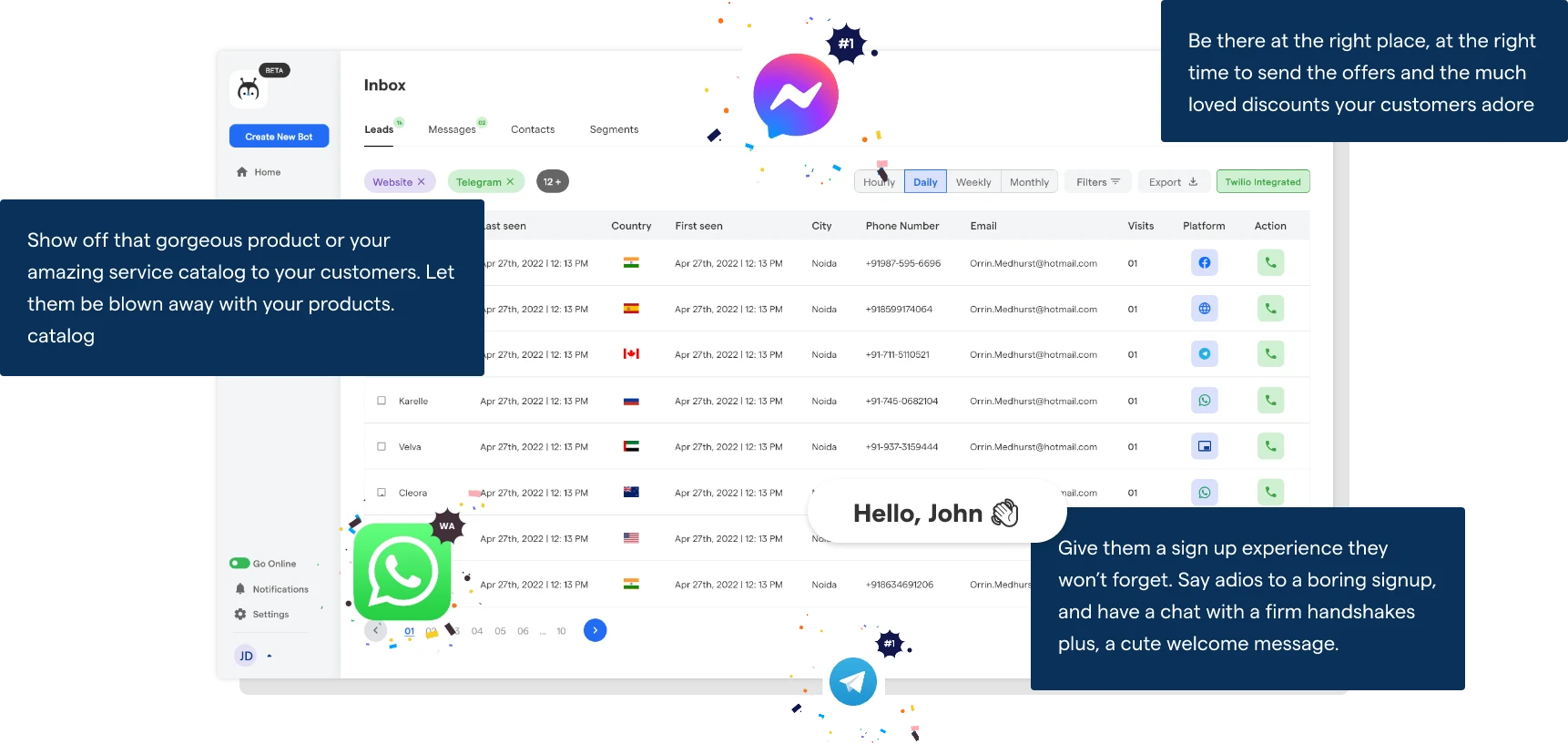
Personalization relies on data. Use AI Agents for marketing to gather and analyze the information needed to understand your audience. There are three primary types of data to focus on:
- Demographics: This includes basic details like age, gender, and location.
- Behavior: Data on browsing habits, purchase history, and time spent on your platform reveals what customers are interested in.
- Preferences: Insights into customer interests, favorite product categories, or specific services help refine your campaigns.
For data collection, use tools like CRM systems (HubSpot, Salesforce), website analytics (Google Analytics), or social media insights (Facebook Audience Insights). These systems integrate well with AI tools, ensuring that data is organized and ready for use.
Step 3
Choose the Right AI Tools
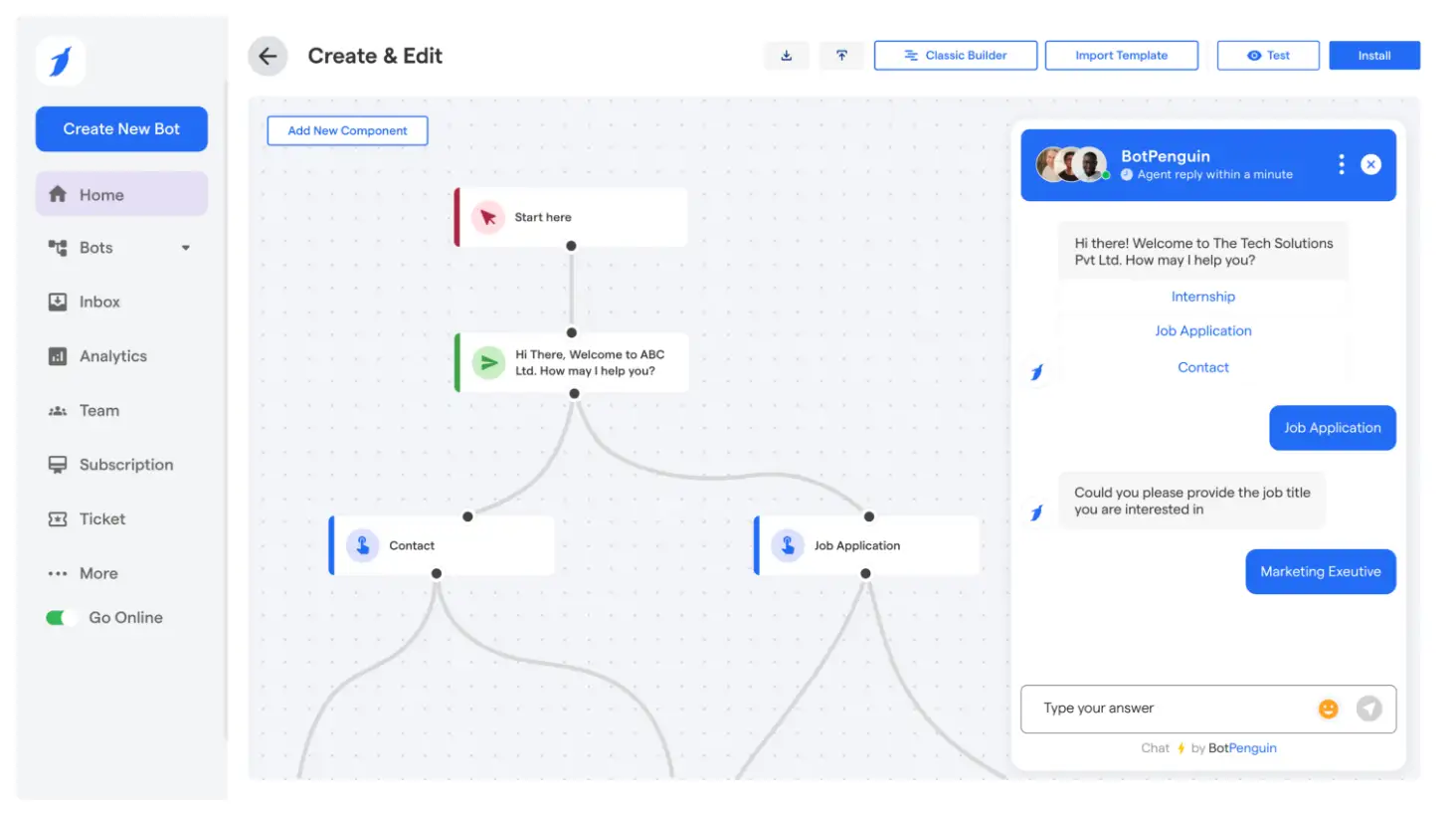
Not all AI tools serve the same purpose. The key is to match the tool to your specific goals and tasks. Here are some common AI tools for personalized marketing:
- Email Automation: Tools like Mailchimp and Klaviyo help you create and send personalized emails at scale.
- Chatbots: Platforms like BotPenguin automate customer interactions, from answering FAQs to generating leads.
- Recommendation Engines: Solutions like Dynamic Yield or Algolia suggest products or services based on user preferences, boosting cross-sells and upsells.
Selecting the right tools ensures that AI Agents for marketing align with your needs and deliver maximum value.
Step 4
Segment Your Audience
Segmentation divides your audience into smaller, manageable groups based on shared characteristics. This is where AI Agents for marketing shine, as they can quickly analyze vast datasets to identify meaningful patterns.
Here are some common ways to segment your audience:
- Behavior: Separate frequent buyers from first-time visitors.
- Interests: Identify segments like tech enthusiasts, fashion lovers, or fitness-focused customers.
- Demographics: Group customers by location, age, or income.
For example, an AI agent can help a retail store by analyzing customer location and behavior to create tailored campaigns. If a customer is interacting with the chatbot from a region with colder weather, it can recommend winter apparel or offer discounts for cold-weather clothing.
Similarly, if a customer is from a warmer area, the agent could highlight summer collections or promotions on lighter fabrics and accessories. By automatically recognizing and responding to location-based preferences, it ensures that each customer receives relevant, timely recommendations.
Step 5
Create Personalized Content
Personalized campaigns require tailored content. AI tools can help you craft messages that resonate with each segment. This includes:
- Emails: Write custom subject lines and content for each audience group.
- Website Content: Highlight specific products or offers based on user preferences.
- Social Media Ads: Customize visuals and copy to match customer interests.
If an AI agent detects a customer’s interest in fitness, based on their previous interactions or browsing behavior, it can suggest workout routines, local fitness events, or special discounts on gym memberships. The more relevant the content, the higher the engagement.
Step 6
Automate Campaigns
Automation ensures consistency and efficiency in delivering personalized experiences. Use AI Agents for marketing to set workflows that handle tasks automatically. Examples include:
- Triggered Emails: Send an email when a customer abandons their cart or completes a purchase.
- Scheduled Social Media Posts: Align posts with customer activity patterns to maximize visibility.
- Special Offers: Automatically send birthday discounts, loyalty rewards, or seasonal promotions.
Automation allows your team to focus on strategy while AI manages repetitive tasks with precision.
Step 7
Deployment and Integration
Once your AI agents for marketing are ready, they must be deployed across marketing channels and integrated into existing systems. This includes:
- Cloud-Based Services: Use platforms like AWS SageMaker, Azure ML, or Google AI to manage AI models efficiently.
- On-Device AI: For faster performance, some AI tools can run directly on local devices using technologies like TensorFlow Lite.
- Seamless Integrations: Connect AI agents with your existing tools, such as HubSpot, Marketo, using APIs.
A well-planned deployment ensures your AI agent for marketing works effortlessly across your marketing channels, enhancing customer interactions and campaign performance.
Step 8
Monitor and Optimize
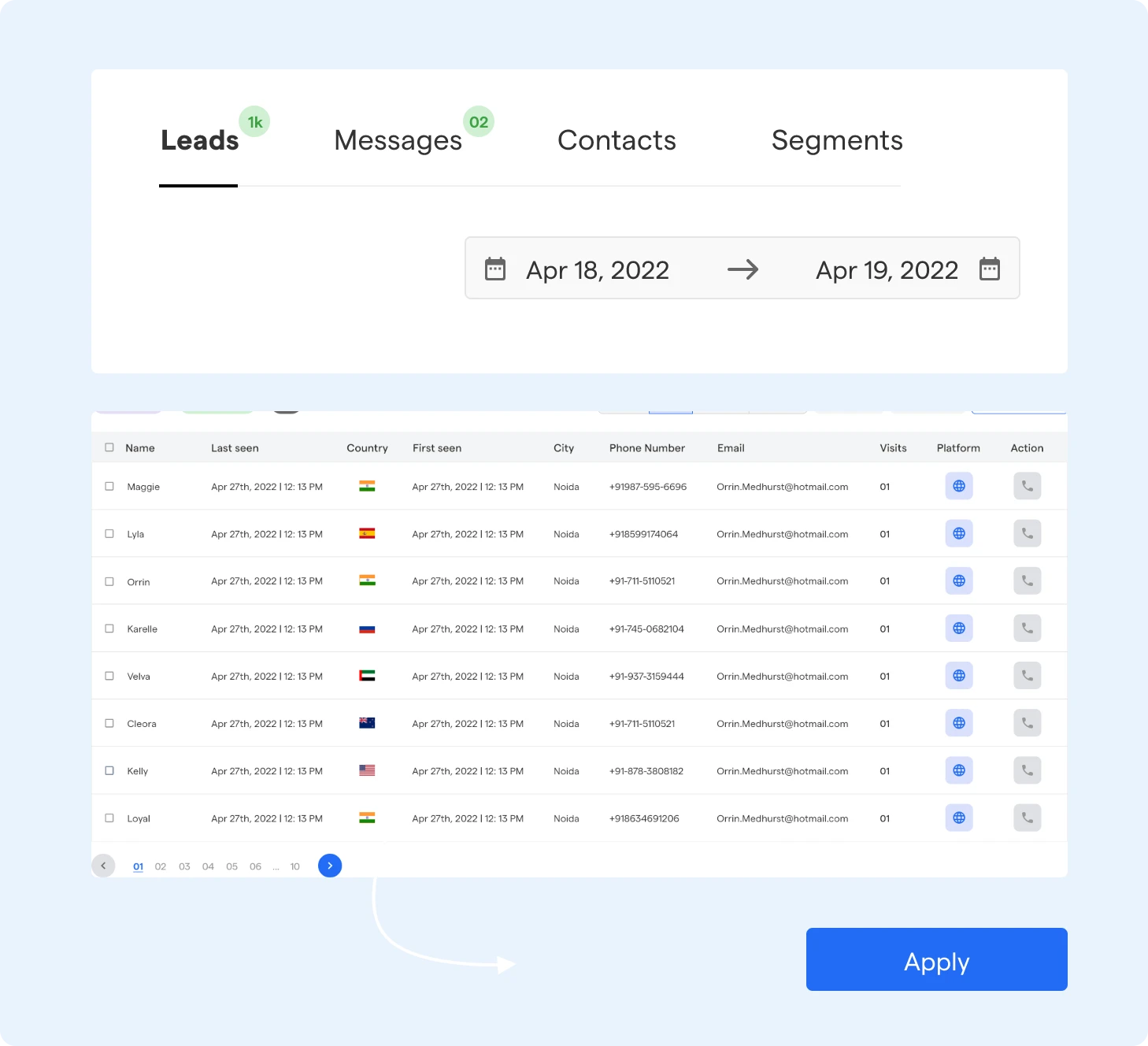
Deploying AI Agents for marketing is not a one-time task. Continuous monitoring and improvement are essential for long-term success. Use AI analytics tools to track key metrics, such as:
- Engagement: Monitor click-through rates, likes, or shares.
- Conversion Rates: Measure how many users take desired actions, like making a purchase.
- Customer Retention: Analyze repeat purchases or subscription renewals.
Suppose your email campaign shows low open rates, in such cases, an AI agent can analyze user behavior and suggest adjustments, such as refining subject lines or sending emails at optimal times when users are most active.
This continuous feedback loop ensures marketing strategies remain effective and responsive to audience needs.
When businesses follow such structured approaches, deploying AI agents for personalized marketing becomes a seamless process, allowing them to create impactful, data-driven campaigns that truly connect with audiences.
Overcoming Challenges
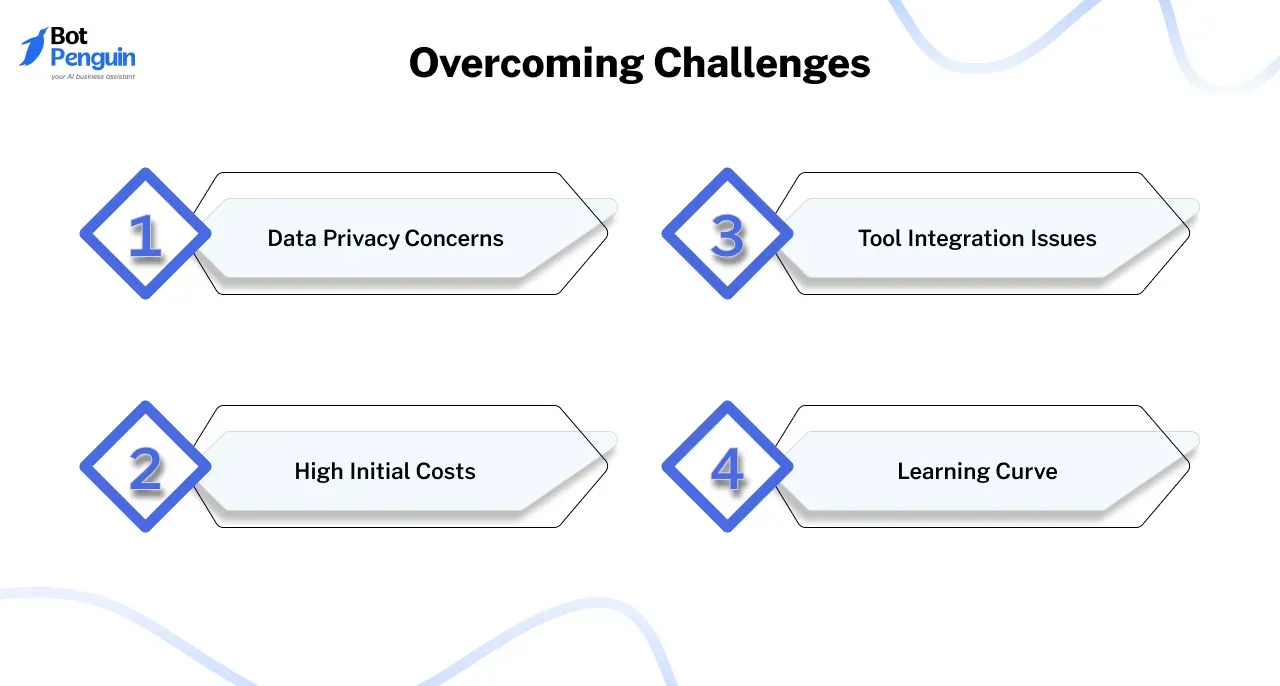
Though adopting AI Agents for marketing brings undeniable benefits, it also comes with challenges.
From privacy concerns to technical hurdles, businesses must address these issues to ensure smooth implementation. Here is how to overcome the most common obstacles.
Data Privacy Concerns
Customers are increasingly cautious about how their data is used. Missteps in handling sensitive information can erode trust and lead to legal issues.
Solution: Use consent-based data collection practices. Be transparent about how customer data will be used and stored. You can choose AI agents like BotPenguin that have clear privacy policies and adhere to data protection regulations such as GDPR.
They implement consent-based data collection practices, ensuring transparency in how customer data is used and stored.
High Initial Costs
Investing in AI tools can feel expensive, especially for small businesses. While the long-term benefits are substantial, the upfront costs may seem like a barrier.
Solution: Start small and scale as you see results. Many affordable AI tools offer robust features for beginners. For instance, platforms like BotPenguin provide entry-level plans that are both cost-effective and powerful making them suitable for small businesses starting with AI tools.
Also, focus on tools that address immediate needs, such as auto-reply or basic customer segmentation. As you experience the benefits of AI Agents for marketing, allocate more resources to expand your capabilities.
Tool Integration Issues
Integrating new AI tools with existing systems like CRM software or e-commerce platforms can be complex. Compatibility issues may lead to inefficiencies or data silos.
Solution: Choose tools designed for seamless integration. Look for solutions with open APIs and strong integration support. You can opt for tools like HubSpot that excel in connecting various platforms, ensuring seamless workflows and efficient data management.
Also, before purchasing any tool, check its compatibility with your current tech stack. Many AI Agents for marketing vendors provide detailed guides and support to ensure smooth integration.
Learning Curve
AI tools can feel intimidating, especially for teams without technical expertise. A steep learning curve can slow adoption and limit the benefits of AI Agents for marketing.
Solution: Invest in training and support. Many AI vendors offer tutorials, webinars, and customer support to help users get started. BotPenguin and Klaviyo are some good examples of platforms that provide extensive knowledge bases and live assistance to ensure users can make the most of their AI tools.
Consider assigning a team member responsible for learning the tool in-depth and training others. With time and practice, teams will grow confident in using AI tools effectively.
To successfully navigate these challenges, businesses must approach AI adoption thoughtfully, focusing on data privacy, cost-effectiveness, integration, and support.
With the right tools and strategies in place, AI can boost your marketing efforts, drive growth, and facilitate stronger customer relationships.
Best Practices for Using AI Agents
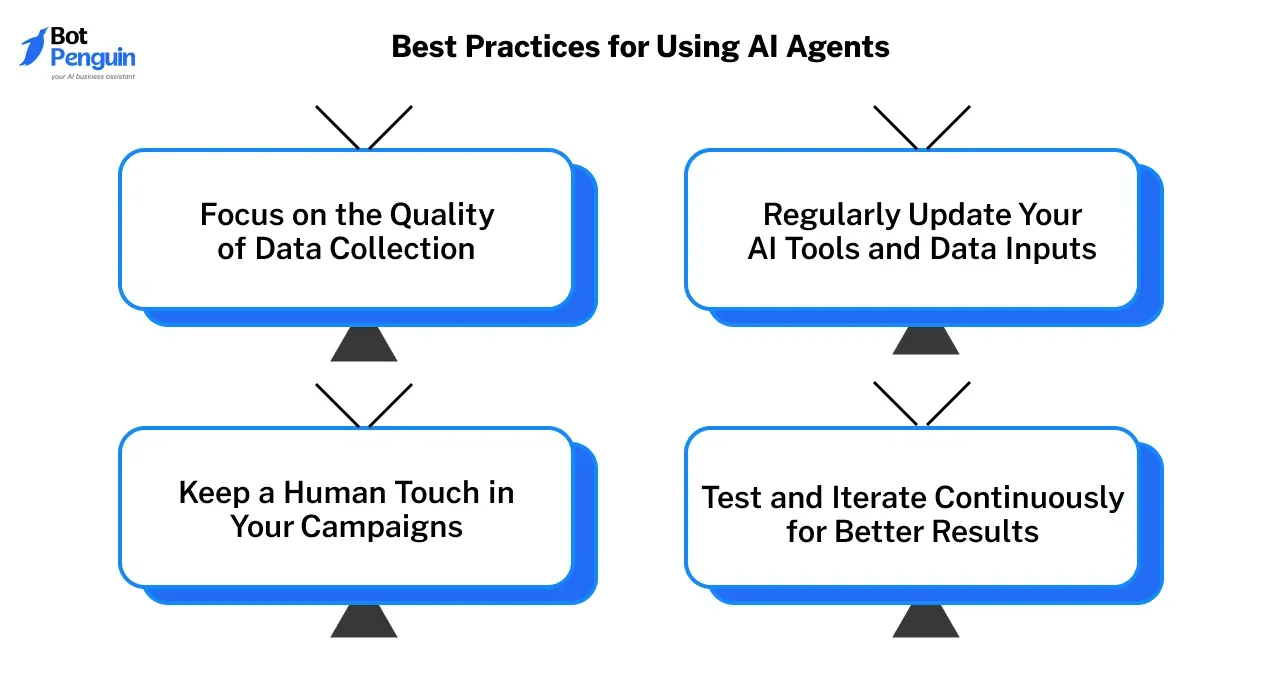
Using AI Agents for marketing effectively is not just about deploying the tools; it is about using them wisely. To ensure success, follow these best practices.
They will help you get the most out of your AI efforts while keeping campaigns human and engaging.
Focus on the Quality of Data Collection
Collecting vast amounts of data can be tempting, but it is more important to gather relevant, high-quality information. Focus on data that directly supports your marketing goals.
For example, tracking customer preferences and purchasing habits is far more useful than collecting unrelated demographic details.
High-quality data improves the accuracy and effectiveness of AI Agents for marketing. It allows them to deliver precise insights and create better-targeted campaigns.
Regularly Update Your AI Tools and Data Inputs
AI systems thrive on fresh data and updates. Outdated inputs can lead to irrelevant recommendations or ineffective strategies. Make it a habit to update your tools and data sources regularly.
Suppose your AI tool is still using last year’s purchasing trends, it won’t reflect current customer preferences. Updating ensures AI Agents for marketing adapt to changes and stay accurate.
Keep a Human Touch in Your Campaigns
AI can handle many tasks, but it shouldn’t replace human empathy in marketing. Use AI Agents for marketing to assist and optimize, but not to completely automate every interaction.
While it is evident that AI can draft personalized emails, adding a little human touch in tone and messaging can make the content more relatable. Similarly, let customers know when they are interacting with a chatbot and offer the option to connect with a person if needed.
Test and Iterate Continuously for Better Results
Keep testing repeatedly for successful results. Use AI Agents for marketing to test different strategies, analyze outcomes, and refine your approach.
Run A/B tests on emails, ads, or website layouts. Initially, you can test two subject lines to see which gets more clicks. Analyze the results, make adjustments, and test again. Continuous iteration leads to better engagement and higher returns.
You can follow these best practices and unleash the full potential of AI agents for marketing, delivering more effective campaigns that are both data-driven and customer-friendly.
Future Trends in AI and Personalized Marketing
Let us explore some key trends shaping the future of AI Agents for marketing.
AI and Voice-Based Marketing
Voice assistants like Alexa, Google Assistant, and Siri are becoming essential in consumer interactions. Businesses are developing Alexa skills and similar integrations to engage customers through voice-based queries.
For example, a restaurant could allow customers to place orders or check menu updates using voice commands.
AI Agents for marketing on the same line as assistants will play a central role in crafting these voice-based experiences, making interactions more seamless and personalized.
Predictive AI to Anticipate Customer Needs
Predictive AI is set to transform how brands anticipate customer behavior. By analyzing past interactions and preferences, AI Agents for marketing can predict future needs.
BotPenguin can help you analyze customer behavior patterns, such as past purchases and browsing habits, and predict which products a customer might be interested in.
This allows you to send personalized product recommendations even before the customer actively searches for them.
Hyper-Personalization Using Advanced AI Models
Hyper-personalization takes traditional personalization to a whole new level. Advanced AI models can analyze real-time data and micro-interactions to deliver content tailored to the individual.
Instead of generic product recommendations, customers might see suggestions based on current trends, location, and personal preferences, all combined dynamically. This level of precision will redefine customer engagement.
These emerging trends will transform personalized marketing, allowing businesses to deliver more intuitive, relevant, and engaging experiences to customers.
Conclusion
Personalized marketing powered by AI Agents for marketing is no longer optional, but essential. From automating tasks to creating hyper-personalized experiences, AI transforms how businesses engage customers. However, success lies in selecting the right tools and strategies.
Platforms like BotPenguin make this process accessible. As an AI agent and a no-code AI chatbot maker, BotPenguin helps businesses build intelligent chatbots effortlessly.
These bots can handle customer queries, recommend products, and engage users 24/7, all without requiring technical expertise.
By using solutions like BotPenguin, businesses can embrace AI-driven personalization and stay competitive in an ever-evolving digital landscape.
Frequently Answered Questions (FAQs)
How can I integrate AI agents for marketing into my existing systems?
Integrating AI agents for marketing into your current systems, such as CRM software or e-commerce platforms, is relatively easy if you choose tools that offer strong integration support.
Many AI tools, including BotPenguin, come with open APIs and detailed documentation to help ensure smooth integration, enabling you to seamlessly connect your marketing efforts with other business functions.
What industries benefit from AI agents for marketing?
Industries like e-commerce, hospitality, healthcare, and education benefit from AI agents by enhancing customer engagement, automating workflows, and creating personalized user experiences.
How can small businesses use AI agents for marketing?
Small businesses can use no-code platforms like BotPenguin to create AI-driven chatbots, automate customer interactions, and personalize outreach, enabling them to compete with larger companies effectively.
Is it possible for AI agents in marketing to help with data privacy?
AI agents for marketing can help ensure compliance with data privacy regulations, such as GDPR or CCPA. By using consent-based data collection practices, AI agents like BotPenguin can ensure transparency in how customer data is used and stored.
These tools often include features that automatically track consent and safeguard sensitive information, which builds trust with customers.
How do AI agents for marketing impact ROI?
By automating repetitive tasks and delivering personalized campaigns, AI agents for marketing can significantly boost ROI. With targeted messaging, improved customer engagement, and better conversion rates, businesses can see a higher return on their marketing investments.
What are examples of AI tools in marketing?
Examples include chatbots for customer support, email automation tools like Mailchimp, recommendation engines like Dynamic Yield, and AI agents like BotPenguin, all of which streamline marketing efforts and improve personalization.
